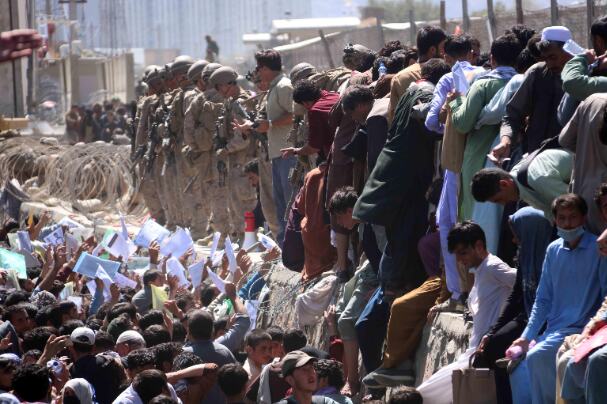The fight must go on

The United States president flagged the chances of more attacks by terror groups as the deadline for the US troops withdrawal inches closer. The West — the US in particular — views the Kabul bombing as an attempt to hinder their evacuation process, but they will not be stopped by such misadventures. Amid all this, there appears to be a shaping of narrative that the war is on — and the Western front is not willing to give in. This narrative of being in a war and leading the fight is too tempting to part away with — however bleak it may seem. The real adversaries, however, seem to be missing in this new picture of war. The Taliban are putting forth their point for acceptance at the global stage; they have come to understand the importance of recognition in geopolitics. Also, it is clear to the West and the rest of the world that the Taliban are the real power center in Afghanistan. The West and the Taliban, in good or bad terms, now seem to understand each other's need. The Taliban control has now become the reality that has to be accepted in whatever case it may be. The West and the world appear to be articulating the rendering of acceptance in way that would save the grace for them. For the US president — who has suffered much humiliation and criticism for the Taliban takeover of Afghanistan — the new enemy is the Islamic State Khorasan Province (ISKP) that has claimed the Kabul bombings. The ISKP terror group has been already pushed to the fringe by the Taliban and the Afghanistan government. The group's hold was reduced to mere two territories in Kunar valley towards the beginning of the year 2020. It is true that fallouts of the Kabul airport bombing have been grave — killing more than a hundred people including over a dozen from the US troops. As a nation, the least and the most the US could have done was to vow an act of revenge. The fact however remains that the ISKP remain a less formidable threat than the Taliban. The humiliation brought out by the Taliban is far greater in magnitude than by the ISKP — the group which is nothing but a disaffected small fragment of the Taliban itself. Taliban's efforts to safeguard the airports from such terror attacks have made global headlines. Does this put the Taliban in a good light? It appears so. The ISKP is at odds with both the Taliban and the US government. The US president has resolved to take revenge on the group and the Taliban is already eager to evict the ISKP from Afghanistan. This may bring the two fronts closer to the common enemy. Neither the Taliban's usurpation of the country nor the imminent threats of human rights violations deserve to be ignored at any cost. Fleeing Afghans — through any mode they find — bear testimony to this conviction. Irrespective of what is being spoken and promised by the Taliban, downgrading of the ethical, moral and democratic values is as clear as crystal in Afghanistan. But still, a bonhomie between the proponents of the same values and the Taliban is not completely out of the box prediction. The fact remains that geopolitics is driven more by national interests than values, and power is the language in which it is communicated. It is the newly gained power of the Taliban that speaks it all. Will the Taliban's emergence as a strong regional player in the geopolitics shut the mouths of many who should speak out loud against them. Behind the Taliban's titbit efforts to gain recognition lies a firm assertion which is clumsy for geopolitical player — they are finding it hard to either accept or reject it. This reluctant acceptance of the Taliban is discouraging as it comes at the cost of possible trampling of rights and liberties of Afghans and security threats to the neighbouring nations. Support from countries like China, Russia and Pakistan has further added fuel to the race of rendering acceptance to the Taliban. There is a word of caution though. If the Taliban is to be accepted at the global stage, the negotiations must be rigorous and the bargain more leaned towards positivity. Being submissive or in the rush could be harmful and decide the course of developments in the years to come. The military war may be over for the stakeholders who had been involved in Afghanistan for decades. Now is the time for the diplomatic war to ensure that the limits are set for the Taliban. Alongside avenging upon the casualties faced in the Kabul bombing, the world must keep bargaining in toughest terms with the Taliban, and not be submissive.



